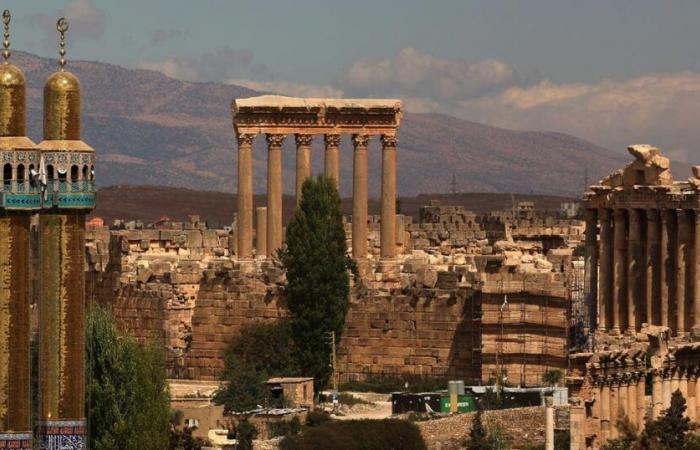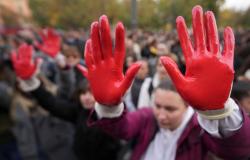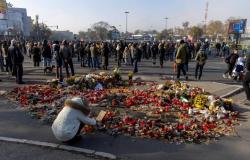The metropolis, in the Bekaa plain, famous for its Roman temples and listed as a UNESCO world heritage site, is facing a dramatic situation.
The city becomes deserted. For more than a month, the legendary Palmyra hotel has not accommodated a single tourist who came to explore the Roman ruins of Baalbeck, near which Israeli bombs fell. But Rabih Salika refuses to leave the establishment where he has worked for 24 years. The war between Israel and the pro-Iranian movement Hezbollah, firmly established in Baalbeck, did not disrupt Rabih Salika's daily routine. From room to room, under the high ceilings of the elegant 19th century stone building, he dusts off the old furniture, sweeping the broken glass from the windows blown out by the bombings into the courtyard.
« In 150 years, this hotel has never closed its doors,” the forty-year-old boasts. And despite the current context “the owners want to keep it open ». But the establishment, which welcomed Charles de Gaulle and Lawrence of Arabia, « is totally empty, not a single customer. We don't even serve a single cup of coffee ».
The whole city is impacted by the war. More than half of the 250,000 inhabitants have left, according to the municipality. Those who remain are cooped up in their homes, rushing in the morning to do their shopping because the shops close early. The metropolis, in the Bekaa plain, a Hezbollah stronghold on the Syrian border, lives mainly from tourism, notably thanks to its site inherited from ancient Heliopolis, and classified as a UNESCO world heritage site: it houses « among the largest Roman temples ever built and among the best preserved ».
Also read
“Peace between Israel and Lebanon is now a realistic goal”
Everything has changed. We don't see anyone anymore, most of the people I know have left.
Racha al-Rifaï, a resident of Baalbeck
For a year, despite the exchanges of fire in the south between Hezbollah and Israel, Baalbeck had been relatively spared. But the strikes have intensified in recent weeks. « Today everything has changed »deplores Racha al-Rifaï, 45 years old. « We don't see anyone anymore, most of the people I know are gone ». She stayed to spare her elderly parents from « relive the same difficult experience » in July 2006, during the last war between Hezbollah and Israel. « We had been moved from house to house »she remembers.
The mayor of Baalbeck, Moustafa al-Chall, assures that the strikes targeted « commercial and residential sectors » and specifies that the central market barely opens one hour per day. The residents who remained avoid lingering in the streets « for fear of a raid that could happen at any time »he explains.
Of the city's six hospitals, one is out of service, damaged by an Israeli strike on its outskirts. With the few resources available to the municipality, in a country in the midst of economic collapse, Moustafa al-Chall's services are doing what they can. « We provide aid” to displaced families in a reception center and “we clear the roads after the bombings to reopen them », says the manager.
Like everywhere else in Lebanon, Baalbeck is waiting for the end of hostilities to hope to regain a semblance of normality. In 2024, the number of visitors has collapsed, representing only 5% of the figures recorded the previous year. The city welcomed nearly 70,000 tourists and 100,000 Lebanese visitors. In addition to the million Shiite faithful who come to worship annually at the mausoleum of Sayyida Khawla, daughter of Imam Hussein, founding figure of Shiite Islam.
Also read
In Lebanon, the double punishment of Shiites opposed to Hezbollah who flee the bombings
At the beginning of October, a strike near Roman ruins caused a stir in Lebanon. The governor of the region, Bachir Khodr, had warned against « the negative repercussions » of these bombings for the site, whether « the black smoke that impacts the stone, or the blast of the explosion » which weakens the structure.
With its colossal constructions built over more than two centuries, « Baalbeck remains one of the most imposing remains of imperial Roman architecture at its peak »recalls Unesco on its website. She praises the temple of Jupiter and « its columns 20 meters high”, and a second temple dedicated to Bacchus, which stands out for “a rich and abundant decoration ». Questioned by AFP, the agency said « closely monitor the impact of the current crisis » on Lebanese heritage.
For Hussein al-Jammal, life in Baalbek has changed radically. « The streets were full of life, the restaurants were open, the markets crowded »he says. « Now there is no one left ». For safety, this 37-year-old man sent his wife and their two children away. He stayed because he did not want to abandon his commitment to a local NGO. There are still seniors living in his neighborhood. « Every morning I visit them to see what they need »he assures. « I can't leave ».






